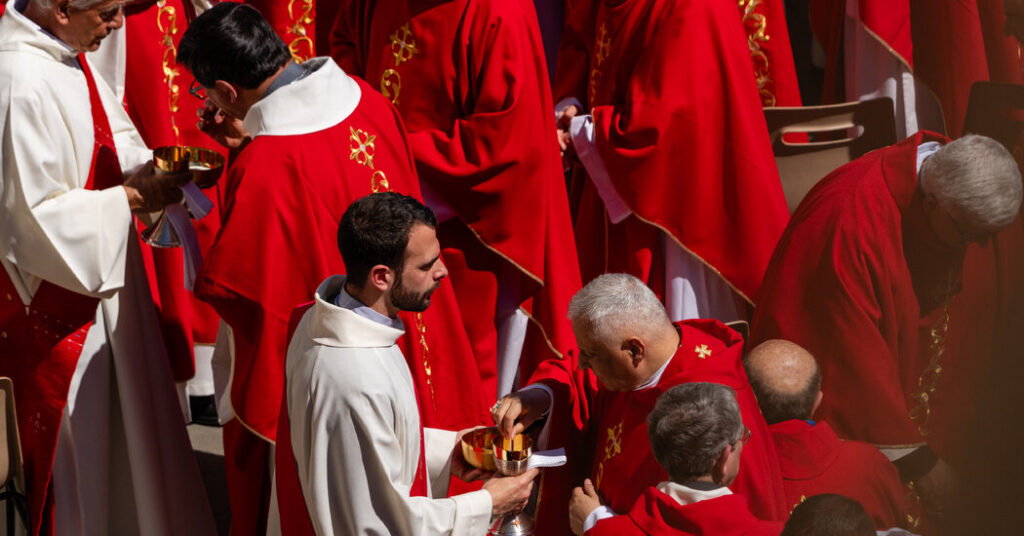In March 2013, Cardinal Jorge Mario Bergoglio from Argentina delivered a brief, approximately four-minute talk during a private meeting at the Vatican prior to the conclave that was set to elect the next pope. His comments envisioned a church that stepped beyond its usual comfort zones and self-centered tendencies, resonating strongly with those present.
When the cardinals cast their votes in the Sistine Chapel a few days later, they chose him as their leader, and he took the name Pope Francis.
On Monday, following a weekend attended by hundreds of thousands for Francis’ funeral and burial, cardinals will embark on a crucial week of meetings. During this time, church leaders—including those seen as potential papal candidates—will make succinct remarks about the significant issues confronting the church. These discussions began the day after Francis’ passing, but will now intensify, turning into a brief campaign-like atmosphere leading up to next month’s conclave.
These gatherings allow cardinals—particularly those below 80 who are eligible to vote—to assess each other and understand their priorities, agendas, and personalities. Also known as general congregations, these meetings provide a setting for potential candidates to shine. A key principle in papal campaigning is the absence of obvious campaigning; self-promotion and blatant political maneuvering are strictly off-limits in this informal campaign.
In the words of Vatican experts: Anyone who enters the conclave as pope leaves as a cardinal.
This hasn’t always been the case, however. In 2005, Cardinal Joseph Ratzinger, who was the dean of the College of Cardinals at the time, delivered a memorable funeral eulogy for Pope John Paul II, where he famously criticized the “dictatorship of relativism.” He entered the conclave with considerable support and emerged as Pope Benedict XVI.
At Francis’ funeral, Cardinal Giovanni Battista Re, the current dean of the College of Cardinals, who at 91 cannot participate in the conclave, delivered a homily. Although he isn’t seen as a viable candidate, he took the opportunity to steer the discussion by highlighting the immense crowds attracted by Francis’ appeal and philosophy, subtly suggesting that his fellow cardinals should choose someone who continues in Francis’ footsteps.
“He was also a pope attuned to the signs of the times,” Cardinal Re stated, “and what the Holy Spirit was igniting within the church.”
Francis didn’t have a similar platform for political speech-making. Instead, he captured the attention of his fellow cardinals with his humility and insightful comments during general congregations. “A natural homo politicus,” remarked Archbishop Paul Gallagher, the Vatican’s foreign minister and a close advisor to Francis, referring to his political acumen, even on the global stage. “He has an affinity for politics; it’s not unfamiliar to him.”
The upcoming conclave could commence as soon as May 6, and for potential candidates attending this week’s meetings, the main task will be to emulate Francis’ skill in garnering support without appearing overly eager. They must articulate the right message for these times, balancing whether to adhere to, revert from, or advance beyond Francis’ legacy. Many of the cardinals eligible to vote were appointed by Francis from various countries—“the peripheries,” as he termed them—where high-ranking prelates are rare. Some Vatican analysts suggest this might favor prominent candidates like Cardinal Luis Antonio Tagle of the Philippines, often dubbed the “Asian Francis.”
Numerous other candidates exist, some with progressive views and others leaning conservative.
Generally, the most likely papal candidates tend to keep a low profile, relying on supporting figures to handle the political maneuvering, but they must still leave a discernible impact.
On Sunday, Cardinal Pietro Parolin, who served as Francis’ second-in-command and is viewed by many as a strong contender, spoke during a Mass at St. Peter’s Square attended by about 200,000 people, among whom were many cardinal electors.
He expressed admiration for Francis, stating, “We must embrace his legacy and integrate it into our lives.”
Cardinal Parolin possesses a deep understanding of the complex world today. He has established connections with many cardinal voters and has successfully implemented Francis’ vision, but is perceived as more measured, which may attract a broader range of moderate voters. His Italian background could also play a role, as there is a prevailing sentiment among some Italian and European cardinals for a change from the peripheries. Well-versed in Vatican matters, Cardinal Parolin is regarded as less confrontational toward the Curia, the church’s administrative body, compared to Francis.
The young people at Sunday’s Mass seemed more focused on the need for an inspiring pope than on the inner workings of the Vatican.
“More inclusion,” said Lara Cappuccelli, a 19-year-old from Piedmont, Italy.
During the service on Sunday, reporters inquired about when the conclave might start, to which the Vatican spokesman replied that he was unsure.
That decision, too, will ultimately be made during the general congregations.


